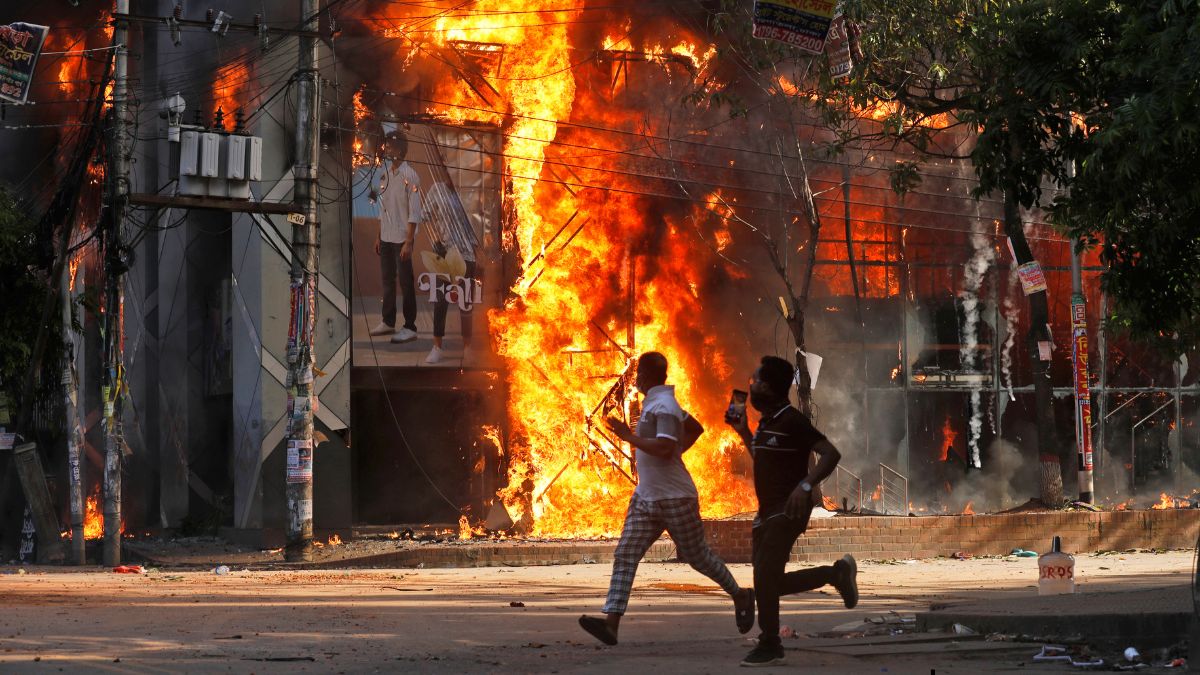In the largest mass-movement against Bangladesh’s Prime Minister Sheikh Hasina’s 15-year rule, around 300 people have been killed in clashes between her forces and her opponents seeking her ouster in intense street protests read more
)
Men run past a shopping center which was set on fire by protesters during a rally against Prime Minister Sheikh Hasina and her government in Dhaka, Bangladesh, Sunday, Aug. 4, 2024. (AP Photo/Rajib Dhar)
In the latest round of clashes between Bangladeshi Prime Minister Shekh Hasina’s forces and protesters, at least 99 people were killed on Sunday.
As Bangladesh witnesses its bloodiest day in years, the future of the nation and its long-time ruler Hasina appears uncertain. Even as various sections of the society join hands against her 15-year rule and seek her ouster, she remains firm and unrelenting.
In a sign that she does not intend to offer concessions, Hasina ordered a nationwide curfew from 6 pm local time and suspended mobile internet. She also declared three days of national holiday.
At least 99 people were confirmed killed and hundreds injured, according to Bangla-language newspaper Prothom Alo.
The newspaper reported that at least 14 police personnel were among the dead and at least 300 were among the injured. Of them, at least 13 were killed when the Enayetpur police station in Sirajganj district was attacked by a mob.
The violent incidents were witnessed throughout Bangladesh. The newspaper reported that most deaths were reported in Sirajganj where 22 people, including 13 police personnel, were killed. Five people were also killed in Dhaka.
The Daily Star reported that WhatsApp and Facebook have also been said to be non-functional in several parts of Bangladesh. Last month, along with curfew and military deployment, Hasina had also banned internet in the country for several days.
After a break of around two weeks, thousands of protesters returned to Bangladesh’s streets on Sunday against 15 years of Hasina’s reign in which they say she has trampled on the democratic spirits of the country. In last month’s protests, the news agency AFP reported that at least 230 were killed and several hundreds were injured as Hasina deployed military amid a nationwide curfew to crush the movement.
As Hasina faces unprecedented challenges, the question is being asked if she is facing an ‘Arab Spring’ moment. The ‘Arab Spring’ refers to a wave of popular movements against authoritarian leaders in the Middle East in 2010-11. The wave began in Tunisia and spread to other countries including Egypt. While the regimes in Tunisia and Egypt were toppled, the movements in Syria and Yemen have not been successful.
‘Prepare to liberate Bangladesh’
The organisers of the ongoing movement have dubbed it as one meant to liberate Bangladesh from Hasina’s rule.
Asif Mahmud, one of the key protest leaders, said in a Facebook post that people should prepare weapons.
“Prepare bamboo sticks and liberate Bangladesh,” wrote Mahmud on Facebook Sunday, as per AFP.
The movement against Hasina is being waged under the banner of Anti-Discrimination Student Movement (ADSM), according to The Daily Star.
Even though the movement last month started as a protest against the Bangladesh’s job quota system which the critics said gave undue favours to Hasina and her supporters, it soon turned into a movement against her — the biggest challenge to her 15-year rule in Bangladesh.
For years, critics have accused Hasina of systemically cracking down on the Opposition in the country and running the country with an iron-fist and presiding over severe democratic backsliding. Earlier this year, Hasina effectively won the election unopposed as the main Opposition party, Bangladesh Nationalist Party (BNP), boycotted the election.
During the last month’s protests, Hasina was slammed by domestic as well as international parties over her forces’ violence against the protesters. It was also flagged that her forces had used military vehicles with United Nations (UN) when they were crushing the movement.
Mass movement against Hasina
It’s not only student groups or the Opposition BNP which have come out against Hasina’s reign but several prominent persons have also joined the movement.
The AFP reported that former army chief General Ikbal Karim Bhuiyan turned his Facebook profile picture red in a show of support to the movement.
In a statement with other retired officers, Bhuiyan said, “We are deeply concerned, troubled and saddened by all the egregious killings, torture, disappearances and mass arrests that have been tormenting Bangladesh over the past three weeks. We call the incumbent government to withdraw the armed forces from the street immediately.”
Bhuiyan further said that people “no longer fear to sacrifice their lives”.
“Those who are responsible for pushing people of this country to a state of such an extreme misery will have to be brought to justice,” said Bhuiyan.
The agency further reported that the movement against Hasina has support from all sections of the society, including actors, musicians, and singers.
A group of 47 garment manufacturers, a sector vastly critical to Bangladesh’s economy, has also said it stands in solidarity with the protesters, as per the agency.
Has army turned against Hasina?
Even though the Bangladeshi Army was central to crushing the protests last month, the tone has now remarkably shifted.
In a vague and cryptic message, Bangladesh Army chief Waker-uz-Zaman told officers at military headquarters on Saturday the Army stood with the people.
Whether this meant the Army opposed Hasina’s rule remains unclear.
“Bangladesh Army is the symbol of trust of the people. It always stood by the people and will do so for the sake of people and in any need of the state,” said Zaman, as per AFP.
The support of the Army is critical for Hasina to stay in power and crush her dissenters and the movement against her rule.

 1 month ago
13
1 month ago
13
)
)
)
)
)
)
)
)
)
)
)
)
)
)
)
)
)
)
)
)
)
)
)
)
)
 English (US) ·
English (US) ·